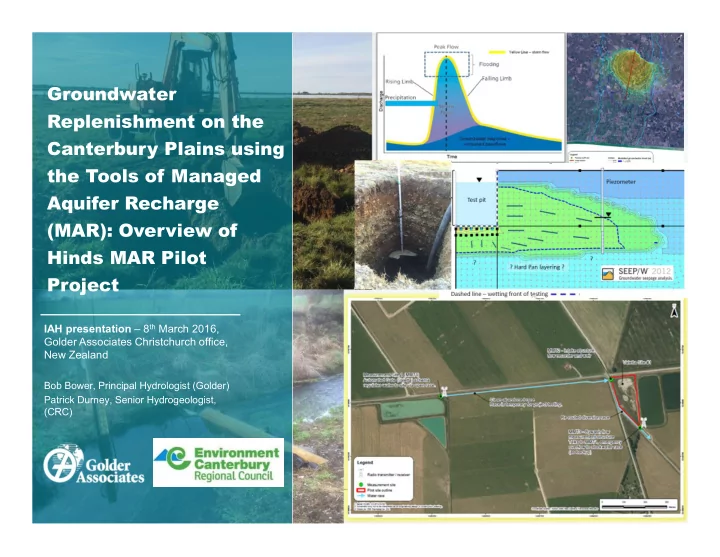

Groundwater Replenishment on the Canterbury Plains using the Tools of Managed Aquifer Recharge (MAR): Overview of Hinds MAR Pilot Project IAH presentation – 8 th March 2016, Golder Associates Christchurch office, New Zealand Bob Bower, Principal Hydrologist (Golder) Patrick Durney, Senior Hydrogeologist, (CRC)
Introduction – 2 Part Presentation Overview – MAR and Sustainable Groundwater Management The tools of MAR Hinds Catchment Drivers MAR pilot project Why we modelled? What we have done (modelling) What we found Discussion session Golder Associates | New Zealand
Golder Associates | New Zealand
Sustainable Groundwater Management USGS – 1999 Sustainability of Groundwater Resources Basic Principles: • Water Budgets - balance • Catchment – scale • Conjunctive management http://pubs.usgs.gov/circ/circ1186/pdf/circ118 6.pdf Golder Associates | New Zealand
A TOOLS OF MAR
Various tools
More tools
The Tools The Tools of MAR of MAR
Managed Aquifer Recharge (MAR)
Ground Water Replenishment Systems
CAP Recharge Program, Arizona October 23, 2018 11
HINDS Plains Canterbury
Golder Associates | New Zealand Golder Associates | New Zealand
Nitrates Area were baseflows need most support
Overview MAR Pilot Project I. II. I. Transfer of Unused Craycroft Stockwater to RDR Intake Recharge water delivered through RDR and II. Valetta Schemes to MAR Site MAR Site operations guided by spring-fed III. III. waterbodies (drains): groundwater levels- rainfall- storm flow trigger condition set for ‘MAR shut down’.
October 23, 2018 19
Pacific Northwest: USA – Spreading Basins Overflow Intake Spreading Basin Monitoring Well
Percolation testing #1 Installed piezometer near pit for complementary testing of rates and Kv versus Kh 23/10/2018 21
Golder Draft modelling results Piezometer 2.5 Test pit ? ? ? Hard Pan layering ? Dashed line – wetting front of testing SEEP/W Hydraulic Modelling simulation of Hinds test pit infiltration trial indicates lateral seepage flows are significantly greater than vertical flows 23/10/2018 22
Taken today – 5-June-2015 Tarbottons Quarry (local) – 7 km down gradient • Local knowledge of hard pan (cemented gravels) layer in Valetta Area • Further investigation indicates ~ 3 to 3.5 m bgl • Hard pan layering Appears to be ~ 2 m below lip of quarry 23
Percolation testing #2 Results • Clamshell Holes (deeper) – Piezometer (6.5 metres) – Pit (~5.0 metres) • Recovery curve indicates 500 L/s potential rate • Modelled rate ~2,000 L/s • Site variability will dictate actual final rate
Conjunctive management conceptualisation Outcomes: • Dilution (nitrogen) with high quality alpine • Offset lost incidental recharge (e.g. piping) source water • Restore groundwater storage • Build an integrated surface and • Increase baseflows groundwater storage systems • Implement advanced on-farm practices to reduce leaching Golder Associates | New Zealand Golder Associates | New Zealand
MAR Pilot – Next steps • 1 year ‘trial’ focus (ADC) • 5 year consents approved • Funding (CRC, Community, IAF (pending) • April construction • Research Partnerships – Lincoln Agritech, Canterbury Health Board, Aqueon (Dillion)
MARing the landscape Managed Aquifer Recharge Modelling – Hinds Mid Canterbury
This not this
Study area and modelling • Hinds - Plan change 2 area. • 3 generations of model: 1. Manually calibrated MIKE SHE model used in support of plan 2. Expanded and refined, pilot point PEST calibrated MIKE SHE model 3. In build probabilistic model
The problem: why model MAR • Provide analysis for community discussion including a possible final MAR array design • To aid in understanding likely impacts of MAR pilot including aiding the consenting process • Assess the actual effects of the trial and the applicability to the rest of the catchment
What we did and changes between models • 2 numerical SZ layers • Extended and corrected boundary • manually calibrated SZ zones • 3 numerical SZ layers • Coastal streams modelled as • Pilot point PEST calibrated SZ lumped drain codes • Coastal streams modelled as rivers
What we found First model • Large volumes required to off set declines in flow and groundwater level • 3.1 m 3 /s to offset lost incidental recharge • 2.8 m 3 /s to off set groundwater use
Hinds Catchment: Groundwater Replenishment Programme GRS Focus Areas Upper Plains – large infiltration basins (water banking) Mid-Plains: ‘on-farm’ galleries or smaller basins (nitrogen mitigation and water banking) Coastal springs: basins/galleries (targeted baseflows and offset pumping)
Ground Water Replenishment Scheme Modelling MIKE SHE (DHI) Model Patrick Durney (2014, 2015) HINDS Plains Canterbury
Ground Water Replenishment Scheme Modelling 4 th Year MIKE SHE (DHI) Model Patrick Durney (2014, 2015) HINDS Plains Canterbury
Ground Water Replenishment Scheme Modelling 10 th Year MIKE SHE (DHI) Model Patrick Durney (2014, 2015) HINDS Plains Canterbury
Groundwater storage and restored Ground Water Storage & baseflows Restored Baseflows Spring-fed streams baseflows (m 3 /s) Change in storage (million m 3 ) Year 1 Year 15 Year 30
What about the trial then? • The second model suggests…. • Up to 4.5 m head rise beneath trial site outside of operational season. • Head will rise to just beneath recharge basin during operation • Spring fed streams will pick up water and mute head rise down gradient • There is low risk of groundwater flooding because of the spring fed streams and the managed nature of the trial
Generation 3
This is the END!
Discussion? Golder Associates | New Zealand
Staff photos before and after modelling the Hinds
Discussion? Golder Associates | New Zealand
Golder Associates | New Zealand
Recommend
More recommend